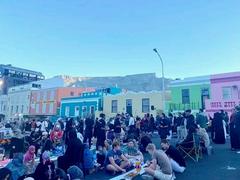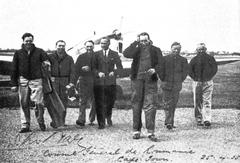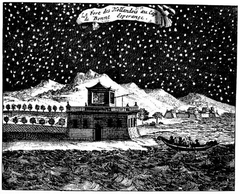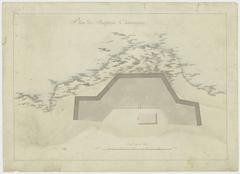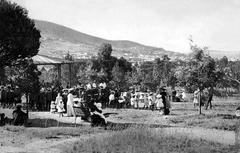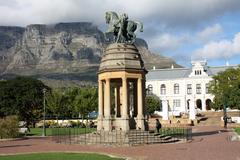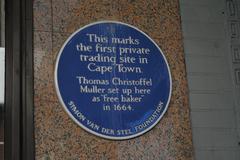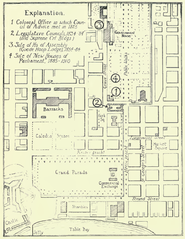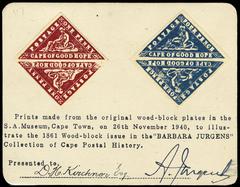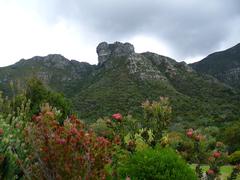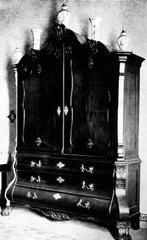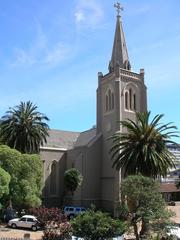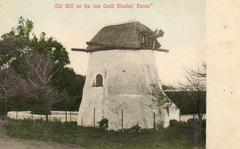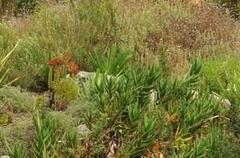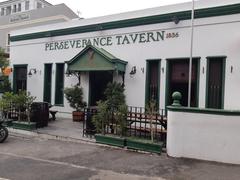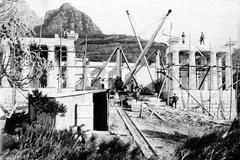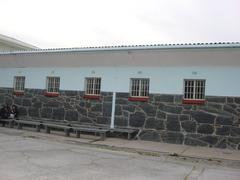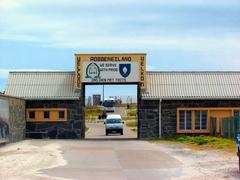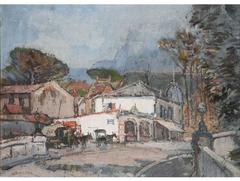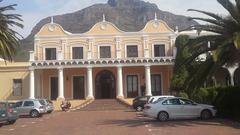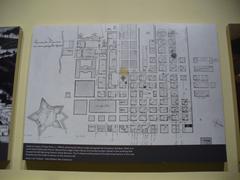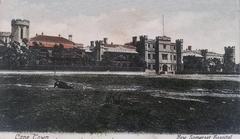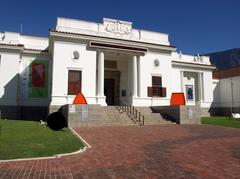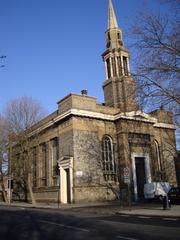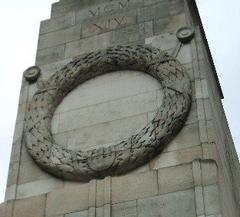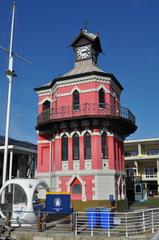Kramat of Sheikh Mohamed Hassen Ghaibie Shah, Cape Town: Visiting Hours, Tickets, and Historical Significance
Date: 14/06/2025
Introduction
Perched atop Signal Hill, the Kramat of Sheikh Mohamed Hassen Ghaibie Shah stands as a powerful symbol of Cape Town’s Islamic heritage and the enduring resilience of its Muslim community. This revered shrine, part of the renowned “Circle of Kramats,” not only commemorates a Sufi saint and political exile but also encapsulates centuries of faith, cultural identity, and anti-colonial resistance. Whether you are a pilgrim, a history enthusiast, or a traveler seeking spiritual and cultural enrichment, this comprehensive guide will prepare you to visit the Kramat meaningfully and respectfully.
This resource covers everything from practical visitor information—such as visiting hours, ticket policies, and accessibility—to cultural etiquette, nearby attractions, and the Kramat’s historical and architectural significance. It also highlights preservation efforts, the role of community organizations, and guidance for engaging with this living heritage site. For the most updated information, visitors are encouraged to consult official sources and the Audiala app, which offers audio guides and further cultural context (The National News; Cape Town Etc; Cape Mazaar Society).
Table of Contents
- Introduction
- The Kramat’s Historical and Spiritual Context
- Practical Visitor Information
- Architectural Features and Site Layout
- Spiritual Atmosphere and Ritual Practices
- Etiquette and Cultural Sensitivity
- Community Engagement and Events
- Nearby Attractions & Travel Tips
- Preservation and National Heritage Status
- Safety and Environmental Responsibility
- Guided Tours and Group Visits
- Frequently Asked Questions (FAQ)
- Visual Content
- References and Further Resources
- Conclusion and Visitor Recommendations
The Kramat’s Historical and Spiritual Context
Sheikh Mohamed Hassen Ghaibie Shah was a Sufi saint and religious leader exiled to the Cape during the Dutch colonial era. As with many Muslim exiles, his forced migration from Asia by the Dutch East India Company laid the foundation for the Cape’s early Muslim community. The Kramat, a tomb shrine, honors his legacy and that of other saints who contributed to the spiritual and cultural fabric of Cape Town (sacredfootsteps.com; gothatwaycapetown.com).
The Kramat is one of 23 shrines forming the “Circle of Kramats”—a spiritual network believed to offer a protective ring around Cape Town, reinforcing the city’s multicultural identity and collective memory. This network is deeply valued by the Cape’s Muslim community and plays a vital role in preserving religious and cultural traditions (thenationalnews.com; Cape Town Etc).
Practical Visitor Information
Visiting Hours and Entry
- Open Daily: Typically from sunrise to sunset (approx. 6:00 AM – 6:00 PM; may vary with seasons and during religious events).
- Entry Fee: Free of charge; donations are appreciated for upkeep.
Accessibility
- Location: Signal Hill, easily accessible from Cape Town’s city center.
- By Car: Drive up Signal Hill Road; free parking is available near the lookout. Arrive early to secure a spot, especially on weekends and holidays.
- By Public Transport: Limited options; taxis or rideshare services are recommended.
- On Foot: Scenic hiking trails from Bo-Kaap or Sea Point are available.
- Pathway: The approach is moderately steep and may not be suitable for wheelchair users or visitors with limited mobility. Contact the Cape Mazaar Society for assistance or alternative arrangements.
Travel Tips
- Best Times to Visit: Early morning or late afternoon for cooler temperatures and optimal photographic conditions.
- What to Bring: Water, sun protection, and comfortable walking shoes. No commercial vendors are on-site.
Architectural Features and Site Layout
The Kramat reflects Sufi simplicity—whitewashed walls with green trimmings, a modest domed tomb, and tranquil gardens with indigenous flora. Benches and shaded areas invite visitors to reflect quietly. Informational plaques in English and Afrikaans detail the Kramat’s significance and the broader Circle of Kramats (Cape Town Etc).
Spiritual Atmosphere and Ritual Practices
The shrine is a place for prayer, contemplation, and community gatherings. Traditional practices include:
- Reciting Quranic Verses and offering prayers (du’a) at the tomb.
- Annual Urs Sharif: Commemorative prayers mark the saint’s death anniversary.
- Offerings: Flowers or incense may be left as symbols of respect.
- Chadar (Ghilaf): The tomb may be draped in green cloth as a sign of reverence (gothatwaycapetown.com).
Etiquette and Cultural Sensitivity
- Dress Code: Modest clothing covering shoulders and knees; head coverings are optional but appreciated for women.
- Shoes: Remove shoes before approaching the tomb area.
- Behavior: Maintain a quiet demeanor; silence mobile phones and avoid disruptive actions.
- Photography: Allowed in exterior areas and gardens; always seek permission before photographing people or inside the tomb.
Both Muslim and non-Muslim visitors are welcome and encouraged to respect the site’s sanctity.
Community Engagement and Events
The Kramat is a hub for community events, interfaith dialogue, and cultural education. The Cape Mazaar Society organizes guided tours, heritage walks, and annual observances, strengthening community bonds and preserving oral histories (capemazaarsociety.com).
Nearby Attractions & Travel Tips
- Signal Hill Lookout: Ideal for panoramic city and ocean views.
- Bo-Kaap: Explore Cape Malay culture and historic architecture.
- Castle of Good Hope: Learn about Cape Town’s colonial history.
- Green Point Urban Park: Enjoy urban green spaces and family-friendly activities.
Combine these sites for a full day of cultural and historical exploration.
Preservation and National Heritage Status
In 2021, the Kramat was declared a National Heritage Site, ensuring its protection and recognition as a cornerstone of South Africa’s cultural landscape (SAHRA; Kramats info sheet). Ongoing conservation efforts, led by local organizations, safeguard the shrine’s integrity for future generations.
Safety and Environmental Responsibility
- Safety: Signal Hill is generally safe by day; avoid isolated areas after dark and secure valuables.
- Weather: Be prepared for rapid changes; bring layers and sun protection.
- Litter: Pack out all waste to help protect the natural environment.
- Fire Risk: No open flames due to the high risk of wildfires in the fynbos ecosystem.
Guided Tours and Group Visits
- Guided Tours: Book through the Cape Mazaar Society or reputable local operators for deep insights into the shrine’s spiritual and historical context.
- Group Visits: Large or educational groups should notify the Society in advance to ensure a respectful and organized visit.
Frequently Asked Questions (FAQ)
Q: What are the visiting hours?
A: Open daily from sunrise to sunset (approx. 6:00 AM–6:00 PM).
Q: Is there an entry fee or ticket required?
A: No, entry is free; donations are appreciated.
Q: Are guided tours available?
A: Yes, arrange via the Cape Mazaar Society.
Q: Is the site wheelchair accessible?
A: Access is limited due to steep paths; contact the Society for assistance.
Q: Can non-Muslims visit?
A: Yes, all are welcome with respectful conduct.
Q: Can I take photographs?
A: Yes, outside the tomb and in the gardens; ask permission if others are present.
Visual Content
- Images: Kramat with Signal Hill backdrop, panoramic city views, and visitors at the shrine.
- Suggested Alt Tags: “Kramat of Sheikh Mohamed Hassen Ghaibie Shah on Signal Hill”, “Cape Town Circle of Kramats sunset view”.
- Maps: Route of the Circle of Kramats and location highlights.
- Interactive Content: Available via the Cape Mazaar Society’s website.
References and Further Resources
- The National News: Circle of Saints
- Cape Town Etc: Islamic Circle of Kramats
- Cape Mazaar Society Official Website
- Kramats Info Sheet, The Heritage Portal
- South African Heritage Resource Agency (SAHRA)
- SacredFootsteps: Cape Town’s Muslim History
- Cape Mazaar Society Contact
Conclusion and Visitor Recommendations
A visit to the Kramat of Sheikh Mohamed Hassen Ghaibie Shah offers a profound journey into Cape Town’s spiritual and cultural legacy. The shrine stands not only as a testament to a revered Sufi saint, but as a living symbol of the Muslim community’s perseverance in the face of adversity. Free entry, stunning views, and the opportunity for guided tours make it accessible and inviting for all. By observing etiquette and supporting preservation, visitors help ensure the Kramat remains a beacon of faith, reflection, and intercultural understanding.
For up-to-date information, audio guides, and more, download the Audiala app and follow heritage organizations on social media. Explore related articles for a deeper dive into Cape Town’s rich tapestry of historical sites.

